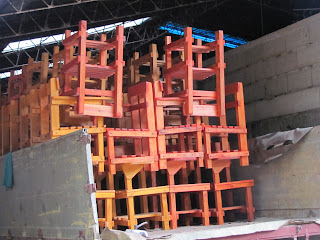Mari Sur Barangay
San Andres as a Local Municipal Unit or LGU is divided into
13 Barangays or villages. It is amazing
how each Barangay has such individual
character. The population of the LGU is
between 15 and 16000 people.

 Mari Sur Barangay is a short drive from the town of San
Andres. The road to the village narrows
as one begins the slight climb. One
experiences tranquility as one approaches.
We are met by the Barangay Captain
Jovita Guro.
Mari Sur Barangay is a short drive from the town of San
Andres. The road to the village narrows
as one begins the slight climb. One
experiences tranquility as one approaches.
We are met by the Barangay Captain
Jovita Guro. Our guide points out that Jovita is presently the only female captain in San Andres.
This Barangay is an excellent rural community to visit, merging traditional with ingenuity in adapting agro resources to find a product to meet a need. The community exhibits vibrancy. The central square is a meeting place for young and old.
One lady is skillfully winnowing mung beans using a handmade
large tray woven from palm fronds. A
fish man is selling fish from the sea from his motorbike. An elder is making a stiff broom from coconut
. Young boys can practice for the
upcoming basketball competition. Goats
nurse their newborns in the shelter.
Local materials from the surrounding forest: coconut, palm, mahogany wooden and bamboo are skillfully crafted to make the traditional homes. A unique little stone church beckons. People have decorated their fence with egg shells to celebrate Easter.
A Fish Farm is operated to provide fish when weather does
not allow fish to be harvested from the sea.
Copra is harvested by farmers in Mari Sur. Tiger Grass is drying along the roadside.
Nito Baskets, another hand crafted family operated
business. Vines are harvested from the
forest in very long pieces. The vines
must be straightened and clipped to prepare them for the basket maker to
weave. One basket takes Moses Martinacio
many hours to hand weave.The lumber industry is important to Mari Sur. Palm and mahogany wood are sawn in the village mill from trees harvested locally.
An opportunity was recognized. Left over scrap wood was being discarded. A chair making industry was developed to meet a need, that of chairs for schools.
John
Rey Mordel took over his uncle’s goat farm eight years ago. His herd numbers 108 momentarily with 80
ewes. The ram is 8 years old and
although gentle, demands respect with his officious curved horns. John says it is easier to bring goat feed(
grass, legume tree, mulberry) to the goats which he chooses to house on the
second floor of the family built goat barn.
The floor is slatted allowing the goat manure to drop and be bagged to
sold for fertilizer. The goats are
raised to 5 months of age, average weight 13-15 kilos and sold. He has one female milking so breeding goats
for milk is possible.
Untouched
by urban development, the intriguing and ingenious close knit Barangay of Mari
Sur offers its residents security from the fluctuations of world stock
markets!













No comments:
Post a Comment